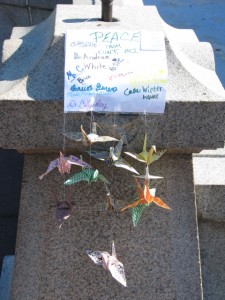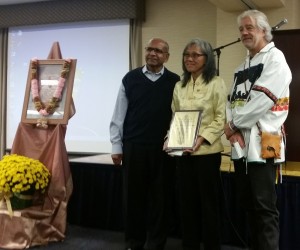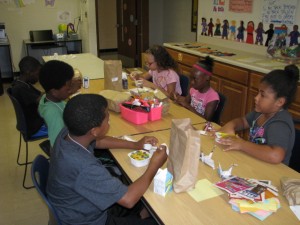Elizabeth Collardey, Ph.D, Associate Professor of Social Work and her husband Tim Collardey, M.S., a retired educator, received the Peace Maker of the Year Award from the Genesee County Committee for Community Peace during its Annual Peace Day Celebration October 3.
Five years ago Dr. Collardey and Tim Collardey started up a peace education class at the Boys & Girls Club of Greater Flint for eight to 12-year-olds in Flint, following their successful program and pilot research study in Iowa.
“We wanted to contribute in a small way to teaching peace skills to others,” Dr. Collardey said. “We rely on the Boys & Girls staff and interns to choose the composition of the group. In the class, we may have leaders, those who are shy or those who struggle behaviorally. We look for a range of skills and needs. That’s the gift of diversity.”
After the group is established, the children meet weekly for 12 weeks, working together to fold 1,000 origami peace cranes, discussing peace in Native American talking circles, joining in small group activities that strengthen communication and problem-solving skills, learning meditation and yoga, and making artwork to express their observations of peace around them. The primary goal of the after-school program is to strengthen each child’s peace literacy and to help them understand peace as a framework for fostering social justice in their community, schools and family. Research is another important component of it.
“The major finding of the pilot study is that children’s sense of peace is related to food,” Dr. Collardey said. Working with Edible Flint, Habitat for Humanity, MSU Extension and community volunteers, children in the peace education class started learning how to grow and harvest food in a garden, including corn, beans, squash, sweet grass, sage and others.
The research also revealed that group work with disadvantaged children increases their social networks; that peace is present when there is an overall increase in interaction among family members; that children lack a language for engaging with peace; and that, for children, peace must be experienced within immediate relationships. Further, the findings indicated that those relationships must be characterized by fairness and equality; being able to accept responsibility for words, actions, and choices; having an opportunity to be expressive through play; feeling safe; and accepting one’s individuality.

Peace cranes created in a peace literacy class.
UM-Flint social work students combine these findings with their individual experiences working as fully-engaged researchers and interns in the Boys & Girls Club peace education classes. The program has expanded to include UM-Flint students from other disciplines as well as those who mentor new student researchers. This year the senior research mentors are April Davis, Egypt Tramble and Elena Woodward. The students will co-present during a national social work conference next April.
Working on her BSW degree at UM-Flint, Davis is in her second year as a social work student intern interviewing kids in the peace class. “We want to see the children’s perception of the meaning of peace,” she said. “We’re there to hear and observe. They define peace not by what it is, but by what it is not.”
Interning under the guidance of Dr. Collardey has helped Davis learn and grow in the discipline. “Dr. Collardey has changed my perspective of leadership,” she said. “She challenges me in a mentoring way. She has given me confidence and lets me think critically – and she has introduced us to the parts of social work that a lot of us were fearful of, which is research. I’ve learned that research is a unique and powerful part of social work.”
To date, the peace education class has enrolled more than 50 children between the ages of seven and 14, and of those children, almost half identify as black and twenty percent identify as mixed race. “Eventually we’d like to include families,” Dr. Collardey said. “I’m continuing to evaluate the effectiveness of the class.”


